International Rule of Law and Investment Law: A Critical Analysis
VerifiedAdded on 2021/08/30
|24
|8989
|77
Project
AI Summary
This project provides a critical analysis of international investment law and arbitration, focusing on the intersection of international rule of law and constitutional justice. It examines the evolution of investment treaties, the rise of investor-state arbitration, and the challenges to the legitimacy of this system. The project explores the role of judicial administration in interpreting and applying legal principles, highlighting concerns about procedural justice, confidentiality, and the potential for overlooking the interests of affected parties. It investigates the relationship between investment treaties and the rule of law, addressing questions about the implementation of rule of law standards, access to investor-state arbitration, and the balance between investor rights and government obligations. The project employs doctrinal research methodology, drawing on primary and secondary sources, including scholarly articles, books, and online resources, to critically evaluate the existing framework and offer suggestions for improvement. The project also discusses how international investment law is creating a dominant position, while also highlighting the shortcomings of the International Rule of Law.
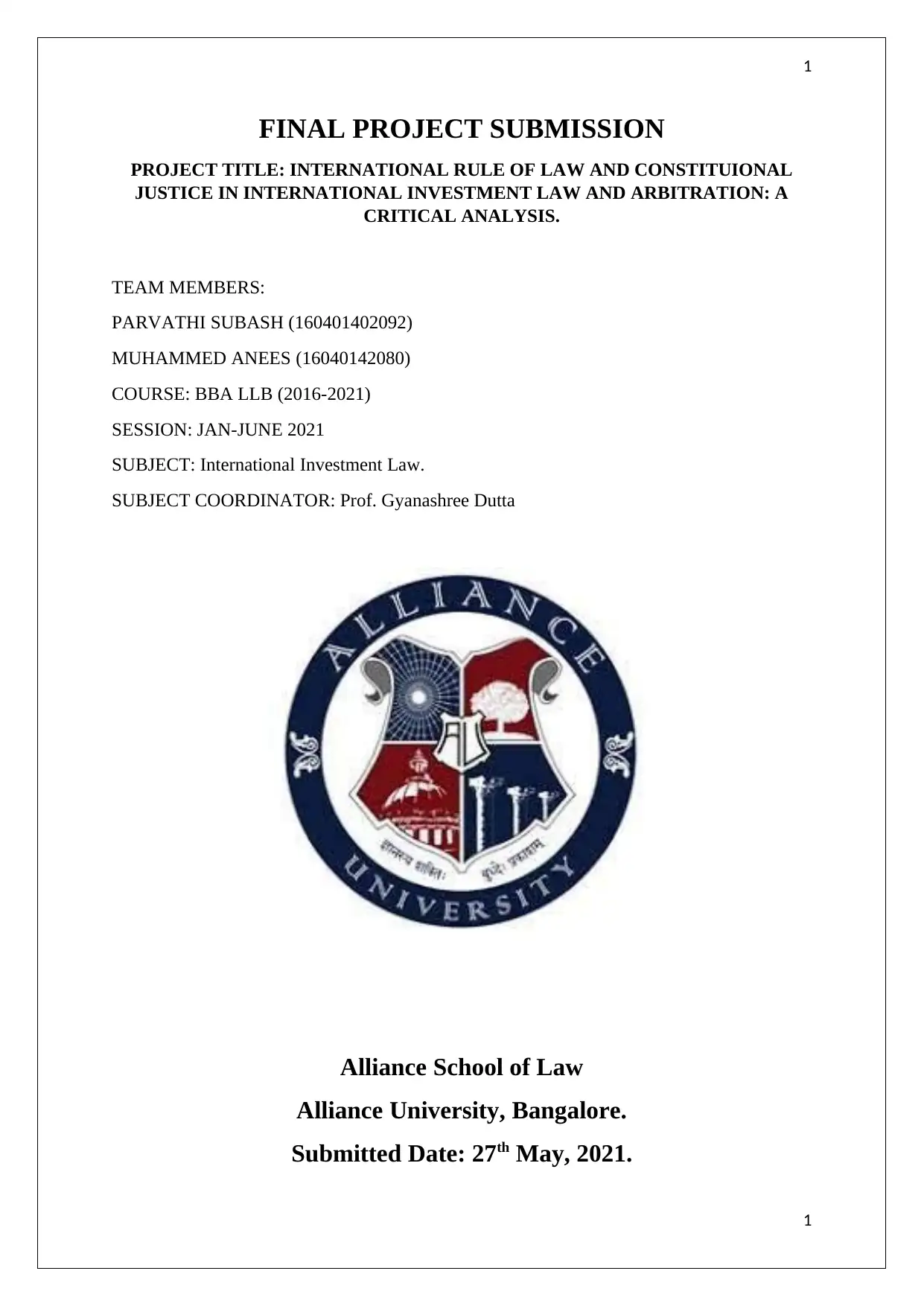
1
FINAL PROJECT SUBMISSION
PROJECT TITLE: INTERNATIONAL RULE OF LAW AND CONSTITUIONAL
JUSTICE IN INTERNATIONAL INVESTMENT LAW AND ARBITRATION: A
CRITICAL ANALYSIS.
TEAM MEMBERS:
PARVATHI SUBASH (160401402092)
MUHAMMED ANEES (16040142080)
COURSE: BBA LLB (2016-2021)
SESSION: JAN-JUNE 2021
SUBJECT: International Investment Law.
SUBJECT COORDINATOR: Prof. Gyanashree Dutta
Alliance School of Law
Alliance University, Bangalore.
Submitted Date: 27th May, 2021.
1
FINAL PROJECT SUBMISSION
PROJECT TITLE: INTERNATIONAL RULE OF LAW AND CONSTITUIONAL
JUSTICE IN INTERNATIONAL INVESTMENT LAW AND ARBITRATION: A
CRITICAL ANALYSIS.
TEAM MEMBERS:
PARVATHI SUBASH (160401402092)
MUHAMMED ANEES (16040142080)
COURSE: BBA LLB (2016-2021)
SESSION: JAN-JUNE 2021
SUBJECT: International Investment Law.
SUBJECT COORDINATOR: Prof. Gyanashree Dutta
Alliance School of Law
Alliance University, Bangalore.
Submitted Date: 27th May, 2021.
1
Paraphrase This Document
Need a fresh take? Get an instant paraphrase of this document with our AI Paraphraser
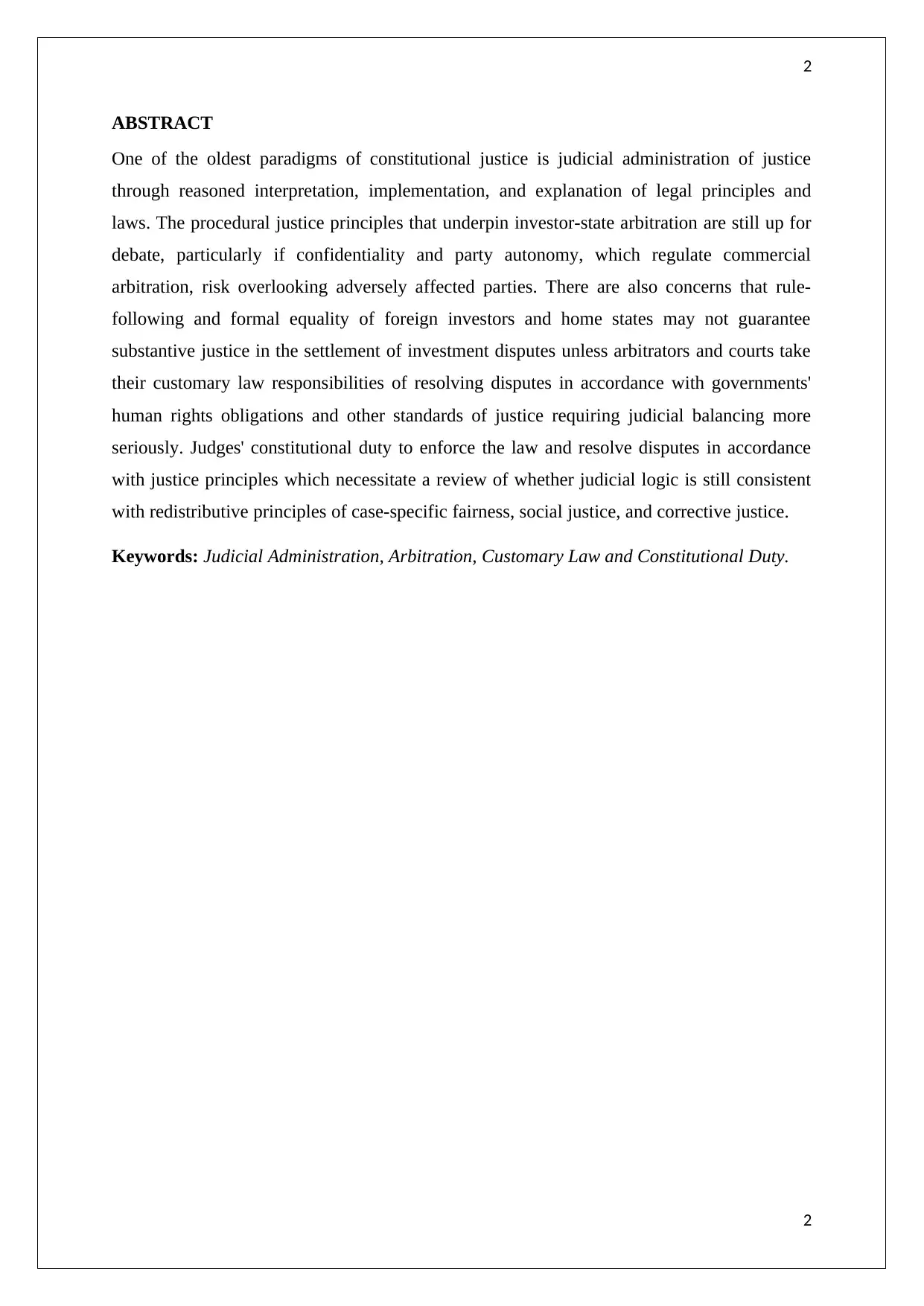
2
ABSTRACT
One of the oldest paradigms of constitutional justice is judicial administration of justice
through reasoned interpretation, implementation, and explanation of legal principles and
laws. The procedural justice principles that underpin investor-state arbitration are still up for
debate, particularly if confidentiality and party autonomy, which regulate commercial
arbitration, risk overlooking adversely affected parties. There are also concerns that rule-
following and formal equality of foreign investors and home states may not guarantee
substantive justice in the settlement of investment disputes unless arbitrators and courts take
their customary law responsibilities of resolving disputes in accordance with governments'
human rights obligations and other standards of justice requiring judicial balancing more
seriously. Judges' constitutional duty to enforce the law and resolve disputes in accordance
with justice principles which necessitate a review of whether judicial logic is still consistent
with redistributive principles of case-specific fairness, social justice, and corrective justice.
Keywords: Judicial Administration, Arbitration, Customary Law and Constitutional Duty.
2
ABSTRACT
One of the oldest paradigms of constitutional justice is judicial administration of justice
through reasoned interpretation, implementation, and explanation of legal principles and
laws. The procedural justice principles that underpin investor-state arbitration are still up for
debate, particularly if confidentiality and party autonomy, which regulate commercial
arbitration, risk overlooking adversely affected parties. There are also concerns that rule-
following and formal equality of foreign investors and home states may not guarantee
substantive justice in the settlement of investment disputes unless arbitrators and courts take
their customary law responsibilities of resolving disputes in accordance with governments'
human rights obligations and other standards of justice requiring judicial balancing more
seriously. Judges' constitutional duty to enforce the law and resolve disputes in accordance
with justice principles which necessitate a review of whether judicial logic is still consistent
with redistributive principles of case-specific fairness, social justice, and corrective justice.
Keywords: Judicial Administration, Arbitration, Customary Law and Constitutional Duty.
2
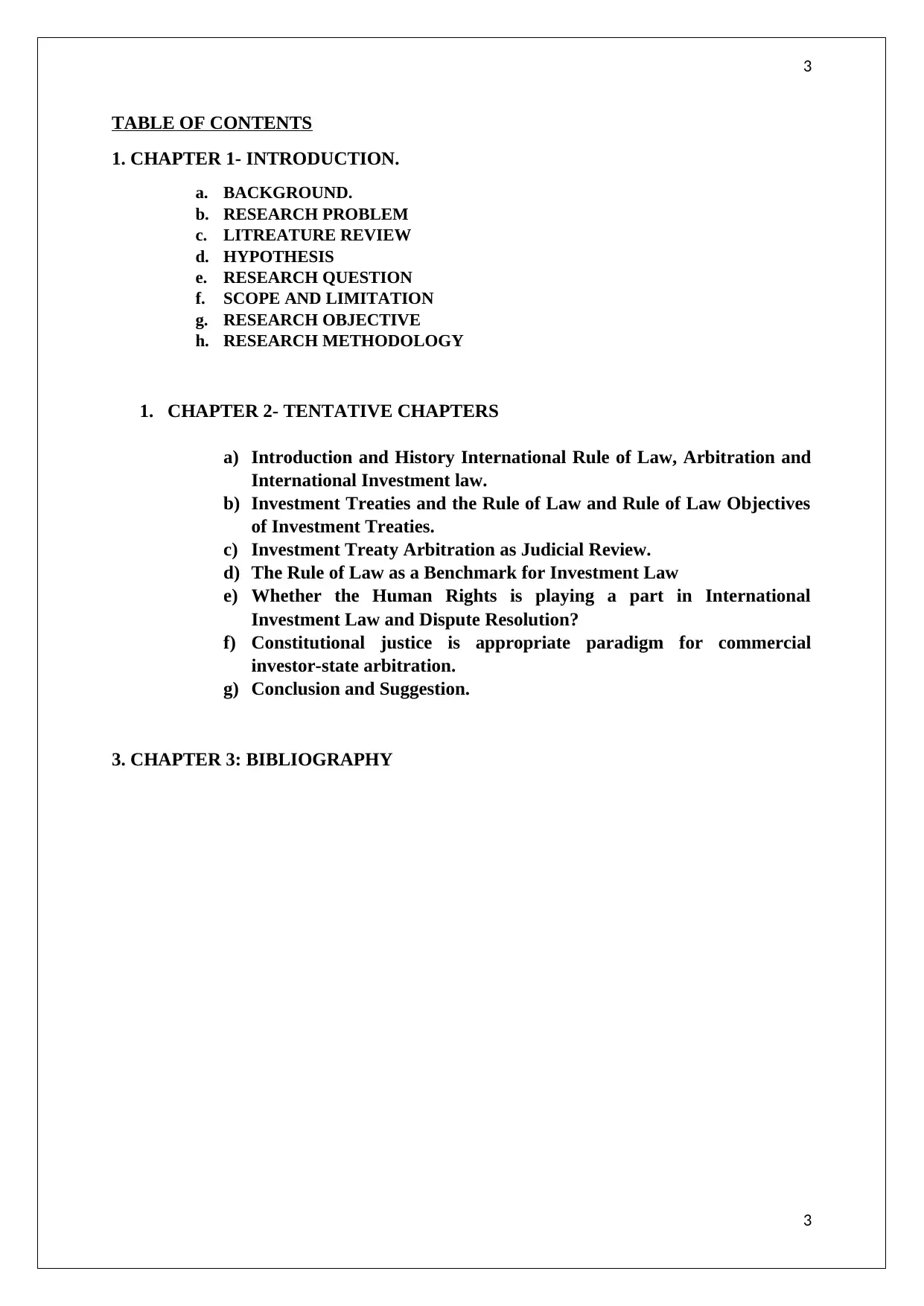
3
TABLE OF CONTENTS
1. CHAPTER 1- INTRODUCTION.
a. BACKGROUND.
b. RESEARCH PROBLEM
c. LITREATURE REVIEW
d. HYPOTHESIS
e. RESEARCH QUESTION
f. SCOPE AND LIMITATION
g. RESEARCH OBJECTIVE
h. RESEARCH METHODOLOGY
1. CHAPTER 2- TENTATIVE CHAPTERS
a) Introduction and History International Rule of Law, Arbitration and
International Investment law.
b) Investment Treaties and the Rule of Law and Rule of Law Objectives
of Investment Treaties.
c) Investment Treaty Arbitration as Judicial Review.
d) The Rule of Law as a Benchmark for Investment Law
e) Whether the Human Rights is playing a part in International
Investment Law and Dispute Resolution?
f) Constitutional justice is appropriate paradigm for commercial
investor-state arbitration.
g) Conclusion and Suggestion.
3. CHAPTER 3: BIBLIOGRAPHY
3
TABLE OF CONTENTS
1. CHAPTER 1- INTRODUCTION.
a. BACKGROUND.
b. RESEARCH PROBLEM
c. LITREATURE REVIEW
d. HYPOTHESIS
e. RESEARCH QUESTION
f. SCOPE AND LIMITATION
g. RESEARCH OBJECTIVE
h. RESEARCH METHODOLOGY
1. CHAPTER 2- TENTATIVE CHAPTERS
a) Introduction and History International Rule of Law, Arbitration and
International Investment law.
b) Investment Treaties and the Rule of Law and Rule of Law Objectives
of Investment Treaties.
c) Investment Treaty Arbitration as Judicial Review.
d) The Rule of Law as a Benchmark for Investment Law
e) Whether the Human Rights is playing a part in International
Investment Law and Dispute Resolution?
f) Constitutional justice is appropriate paradigm for commercial
investor-state arbitration.
g) Conclusion and Suggestion.
3. CHAPTER 3: BIBLIOGRAPHY
3
⊘ This is a preview!⊘
Do you want full access?
Subscribe today to unlock all pages.

Trusted by 1+ million students worldwide
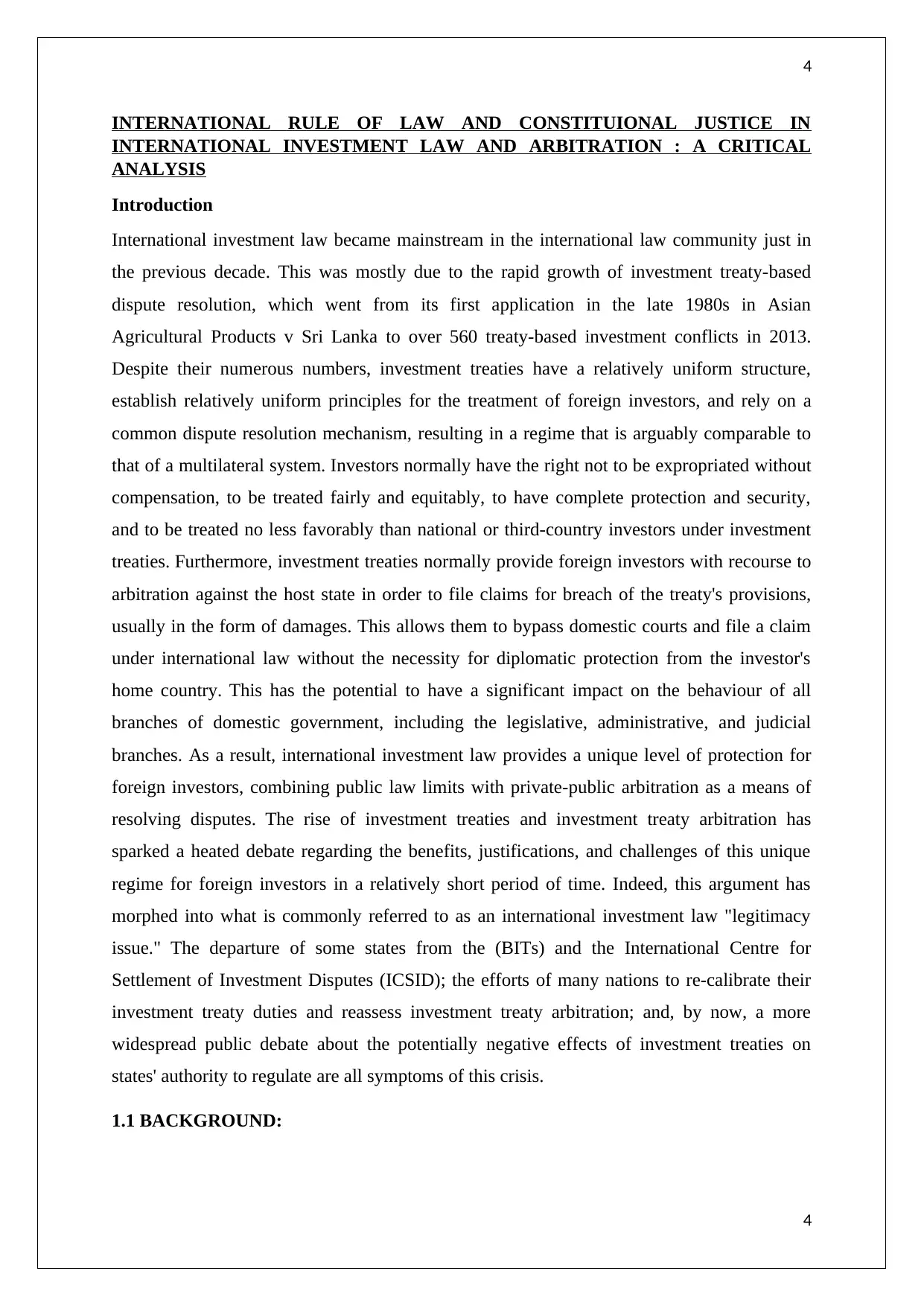
4
INTERNATIONAL RULE OF LAW AND CONSTITUIONAL JUSTICE IN
INTERNATIONAL INVESTMENT LAW AND ARBITRATION : A CRITICAL
ANALYSIS
Introduction
International investment law became mainstream in the international law community just in
the previous decade. This was mostly due to the rapid growth of investment treaty-based
dispute resolution, which went from its first application in the late 1980s in Asian
Agricultural Products v Sri Lanka to over 560 treaty-based investment conflicts in 2013.
Despite their numerous numbers, investment treaties have a relatively uniform structure,
establish relatively uniform principles for the treatment of foreign investors, and rely on a
common dispute resolution mechanism, resulting in a regime that is arguably comparable to
that of a multilateral system. Investors normally have the right not to be expropriated without
compensation, to be treated fairly and equitably, to have complete protection and security,
and to be treated no less favorably than national or third-country investors under investment
treaties. Furthermore, investment treaties normally provide foreign investors with recourse to
arbitration against the host state in order to file claims for breach of the treaty's provisions,
usually in the form of damages. This allows them to bypass domestic courts and file a claim
under international law without the necessity for diplomatic protection from the investor's
home country. This has the potential to have a significant impact on the behaviour of all
branches of domestic government, including the legislative, administrative, and judicial
branches. As a result, international investment law provides a unique level of protection for
foreign investors, combining public law limits with private-public arbitration as a means of
resolving disputes. The rise of investment treaties and investment treaty arbitration has
sparked a heated debate regarding the benefits, justifications, and challenges of this unique
regime for foreign investors in a relatively short period of time. Indeed, this argument has
morphed into what is commonly referred to as an international investment law "legitimacy
issue." The departure of some states from the (BITs) and the International Centre for
Settlement of Investment Disputes (ICSID); the efforts of many nations to re-calibrate their
investment treaty duties and reassess investment treaty arbitration; and, by now, a more
widespread public debate about the potentially negative effects of investment treaties on
states' authority to regulate are all symptoms of this crisis.
1.1 BACKGROUND:
4
INTERNATIONAL RULE OF LAW AND CONSTITUIONAL JUSTICE IN
INTERNATIONAL INVESTMENT LAW AND ARBITRATION : A CRITICAL
ANALYSIS
Introduction
International investment law became mainstream in the international law community just in
the previous decade. This was mostly due to the rapid growth of investment treaty-based
dispute resolution, which went from its first application in the late 1980s in Asian
Agricultural Products v Sri Lanka to over 560 treaty-based investment conflicts in 2013.
Despite their numerous numbers, investment treaties have a relatively uniform structure,
establish relatively uniform principles for the treatment of foreign investors, and rely on a
common dispute resolution mechanism, resulting in a regime that is arguably comparable to
that of a multilateral system. Investors normally have the right not to be expropriated without
compensation, to be treated fairly and equitably, to have complete protection and security,
and to be treated no less favorably than national or third-country investors under investment
treaties. Furthermore, investment treaties normally provide foreign investors with recourse to
arbitration against the host state in order to file claims for breach of the treaty's provisions,
usually in the form of damages. This allows them to bypass domestic courts and file a claim
under international law without the necessity for diplomatic protection from the investor's
home country. This has the potential to have a significant impact on the behaviour of all
branches of domestic government, including the legislative, administrative, and judicial
branches. As a result, international investment law provides a unique level of protection for
foreign investors, combining public law limits with private-public arbitration as a means of
resolving disputes. The rise of investment treaties and investment treaty arbitration has
sparked a heated debate regarding the benefits, justifications, and challenges of this unique
regime for foreign investors in a relatively short period of time. Indeed, this argument has
morphed into what is commonly referred to as an international investment law "legitimacy
issue." The departure of some states from the (BITs) and the International Centre for
Settlement of Investment Disputes (ICSID); the efforts of many nations to re-calibrate their
investment treaty duties and reassess investment treaty arbitration; and, by now, a more
widespread public debate about the potentially negative effects of investment treaties on
states' authority to regulate are all symptoms of this crisis.
1.1 BACKGROUND:
4
Paraphrase This Document
Need a fresh take? Get an instant paraphrase of this document with our AI Paraphraser
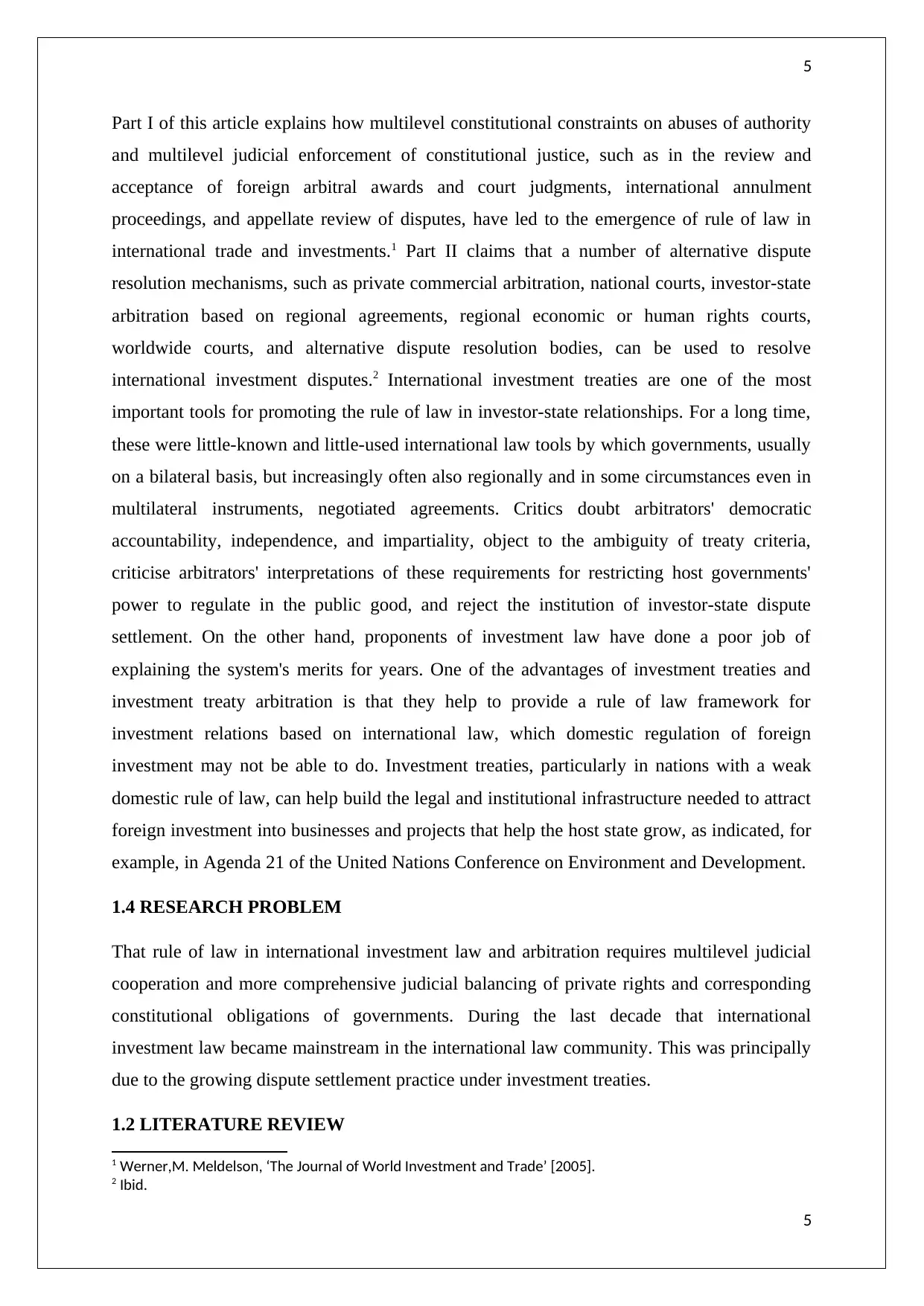
5
Part I of this article explains how multilevel constitutional constraints on abuses of authority
and multilevel judicial enforcement of constitutional justice, such as in the review and
acceptance of foreign arbitral awards and court judgments, international annulment
proceedings, and appellate review of disputes, have led to the emergence of rule of law in
international trade and investments.1 Part II claims that a number of alternative dispute
resolution mechanisms, such as private commercial arbitration, national courts, investor-state
arbitration based on regional agreements, regional economic or human rights courts,
worldwide courts, and alternative dispute resolution bodies, can be used to resolve
international investment disputes.2 International investment treaties are one of the most
important tools for promoting the rule of law in investor-state relationships. For a long time,
these were little-known and little-used international law tools by which governments, usually
on a bilateral basis, but increasingly often also regionally and in some circumstances even in
multilateral instruments, negotiated agreements. Critics doubt arbitrators' democratic
accountability, independence, and impartiality, object to the ambiguity of treaty criteria,
criticise arbitrators' interpretations of these requirements for restricting host governments'
power to regulate in the public good, and reject the institution of investor-state dispute
settlement. On the other hand, proponents of investment law have done a poor job of
explaining the system's merits for years. One of the advantages of investment treaties and
investment treaty arbitration is that they help to provide a rule of law framework for
investment relations based on international law, which domestic regulation of foreign
investment may not be able to do. Investment treaties, particularly in nations with a weak
domestic rule of law, can help build the legal and institutional infrastructure needed to attract
foreign investment into businesses and projects that help the host state grow, as indicated, for
example, in Agenda 21 of the United Nations Conference on Environment and Development.
1.4 RESEARCH PROBLEM
That rule of law in international investment law and arbitration requires multilevel judicial
cooperation and more comprehensive judicial balancing of private rights and corresponding
constitutional obligations of governments. During the last decade that international
investment law became mainstream in the international law community. This was principally
due to the growing dispute settlement practice under investment treaties.
1.2 LITERATURE REVIEW
1 Werner,M. Meldelson, ‘The Journal of World Investment and Trade’ [2005].
2 Ibid.
5
Part I of this article explains how multilevel constitutional constraints on abuses of authority
and multilevel judicial enforcement of constitutional justice, such as in the review and
acceptance of foreign arbitral awards and court judgments, international annulment
proceedings, and appellate review of disputes, have led to the emergence of rule of law in
international trade and investments.1 Part II claims that a number of alternative dispute
resolution mechanisms, such as private commercial arbitration, national courts, investor-state
arbitration based on regional agreements, regional economic or human rights courts,
worldwide courts, and alternative dispute resolution bodies, can be used to resolve
international investment disputes.2 International investment treaties are one of the most
important tools for promoting the rule of law in investor-state relationships. For a long time,
these were little-known and little-used international law tools by which governments, usually
on a bilateral basis, but increasingly often also regionally and in some circumstances even in
multilateral instruments, negotiated agreements. Critics doubt arbitrators' democratic
accountability, independence, and impartiality, object to the ambiguity of treaty criteria,
criticise arbitrators' interpretations of these requirements for restricting host governments'
power to regulate in the public good, and reject the institution of investor-state dispute
settlement. On the other hand, proponents of investment law have done a poor job of
explaining the system's merits for years. One of the advantages of investment treaties and
investment treaty arbitration is that they help to provide a rule of law framework for
investment relations based on international law, which domestic regulation of foreign
investment may not be able to do. Investment treaties, particularly in nations with a weak
domestic rule of law, can help build the legal and institutional infrastructure needed to attract
foreign investment into businesses and projects that help the host state grow, as indicated, for
example, in Agenda 21 of the United Nations Conference on Environment and Development.
1.4 RESEARCH PROBLEM
That rule of law in international investment law and arbitration requires multilevel judicial
cooperation and more comprehensive judicial balancing of private rights and corresponding
constitutional obligations of governments. During the last decade that international
investment law became mainstream in the international law community. This was principally
due to the growing dispute settlement practice under investment treaties.
1.2 LITERATURE REVIEW
1 Werner,M. Meldelson, ‘The Journal of World Investment and Trade’ [2005].
2 Ibid.
5
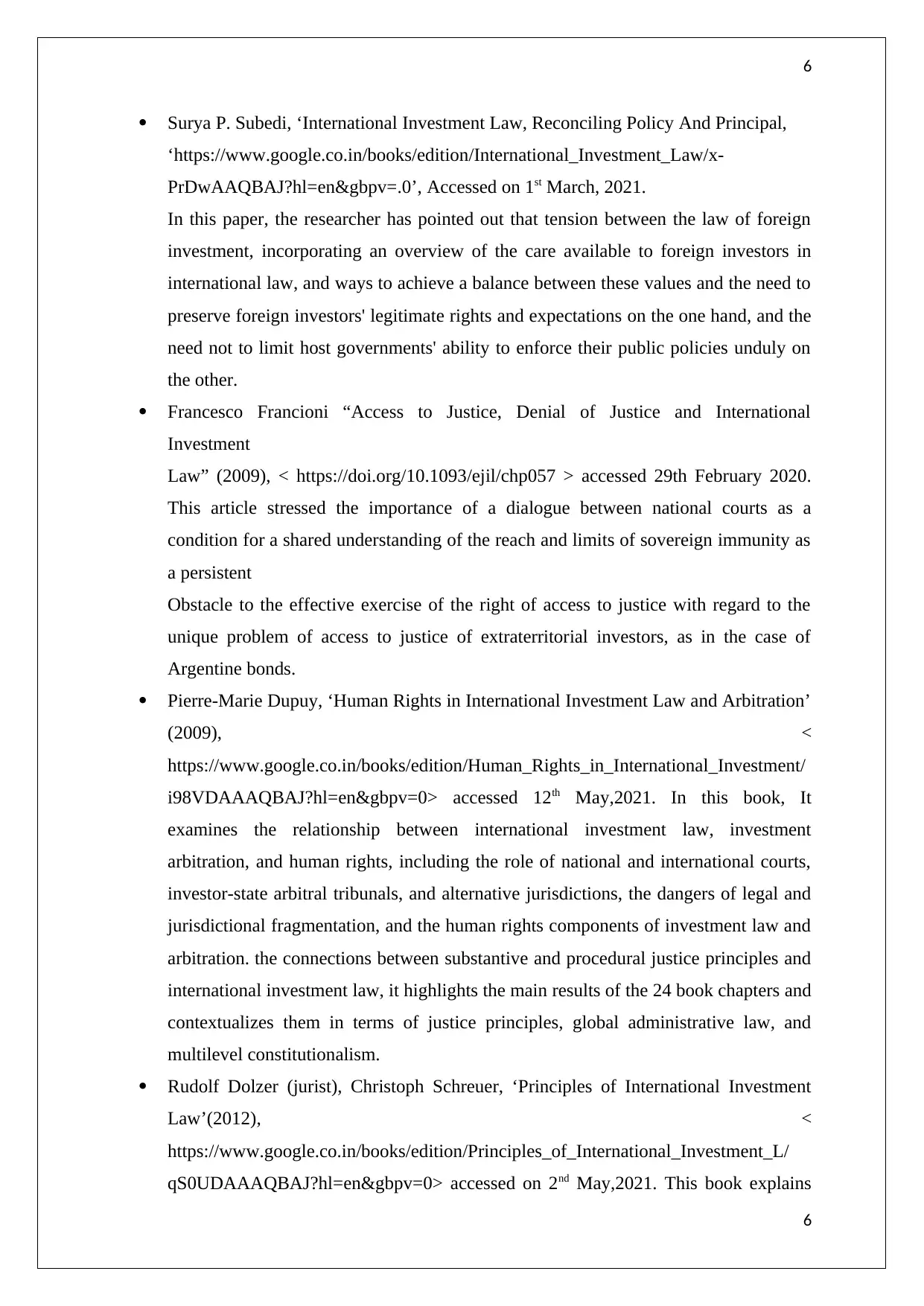
6
Surya P. Subedi, ‘International Investment Law, Reconciling Policy And Principal,
‘https://www.google.co.in/books/edition/International_Investment_Law/x-
PrDwAAQBAJ?hl=en&gbpv=.0’, Accessed on 1st March, 2021.
In this paper, the researcher has pointed out that tension between the law of foreign
investment, incorporating an overview of the care available to foreign investors in
international law, and ways to achieve a balance between these values and the need to
preserve foreign investors' legitimate rights and expectations on the one hand, and the
need not to limit host governments' ability to enforce their public policies unduly on
the other.
Francesco Francioni “Access to Justice, Denial of Justice and International
Investment
Law” (2009), < https://doi.org/10.1093/ejil/chp057 > accessed 29th February 2020.
This article stressed the importance of a dialogue between national courts as a
condition for a shared understanding of the reach and limits of sovereign immunity as
a persistent
Obstacle to the effective exercise of the right of access to justice with regard to the
unique problem of access to justice of extraterritorial investors, as in the case of
Argentine bonds.
Pierre-Marie Dupuy, ‘Human Rights in International Investment Law and Arbitration’
(2009), <
https://www.google.co.in/books/edition/Human_Rights_in_International_Investment/
i98VDAAAQBAJ?hl=en&gbpv=0> accessed 12th May,2021. In this book, It
examines the relationship between international investment law, investment
arbitration, and human rights, including the role of national and international courts,
investor-state arbitral tribunals, and alternative jurisdictions, the dangers of legal and
jurisdictional fragmentation, and the human rights components of investment law and
arbitration. the connections between substantive and procedural justice principles and
international investment law, it highlights the main results of the 24 book chapters and
contextualizes them in terms of justice principles, global administrative law, and
multilevel constitutionalism.
Rudolf Dolzer (jurist), Christoph Schreuer, ‘Principles of International Investment
Law’(2012), <
https://www.google.co.in/books/edition/Principles_of_International_Investment_L/
qS0UDAAAQBAJ?hl=en&gbpv=0> accessed on 2nd May,2021. This book explains
6
Surya P. Subedi, ‘International Investment Law, Reconciling Policy And Principal,
‘https://www.google.co.in/books/edition/International_Investment_Law/x-
PrDwAAQBAJ?hl=en&gbpv=.0’, Accessed on 1st March, 2021.
In this paper, the researcher has pointed out that tension between the law of foreign
investment, incorporating an overview of the care available to foreign investors in
international law, and ways to achieve a balance between these values and the need to
preserve foreign investors' legitimate rights and expectations on the one hand, and the
need not to limit host governments' ability to enforce their public policies unduly on
the other.
Francesco Francioni “Access to Justice, Denial of Justice and International
Investment
Law” (2009), < https://doi.org/10.1093/ejil/chp057 > accessed 29th February 2020.
This article stressed the importance of a dialogue between national courts as a
condition for a shared understanding of the reach and limits of sovereign immunity as
a persistent
Obstacle to the effective exercise of the right of access to justice with regard to the
unique problem of access to justice of extraterritorial investors, as in the case of
Argentine bonds.
Pierre-Marie Dupuy, ‘Human Rights in International Investment Law and Arbitration’
(2009), <
https://www.google.co.in/books/edition/Human_Rights_in_International_Investment/
i98VDAAAQBAJ?hl=en&gbpv=0> accessed 12th May,2021. In this book, It
examines the relationship between international investment law, investment
arbitration, and human rights, including the role of national and international courts,
investor-state arbitral tribunals, and alternative jurisdictions, the dangers of legal and
jurisdictional fragmentation, and the human rights components of investment law and
arbitration. the connections between substantive and procedural justice principles and
international investment law, it highlights the main results of the 24 book chapters and
contextualizes them in terms of justice principles, global administrative law, and
multilevel constitutionalism.
Rudolf Dolzer (jurist), Christoph Schreuer, ‘Principles of International Investment
Law’(2012), <
https://www.google.co.in/books/edition/Principles_of_International_Investment_L/
qS0UDAAAQBAJ?hl=en&gbpv=0> accessed on 2nd May,2021. This book explains
6
⊘ This is a preview!⊘
Do you want full access?
Subscribe today to unlock all pages.

Trusted by 1+ million students worldwide
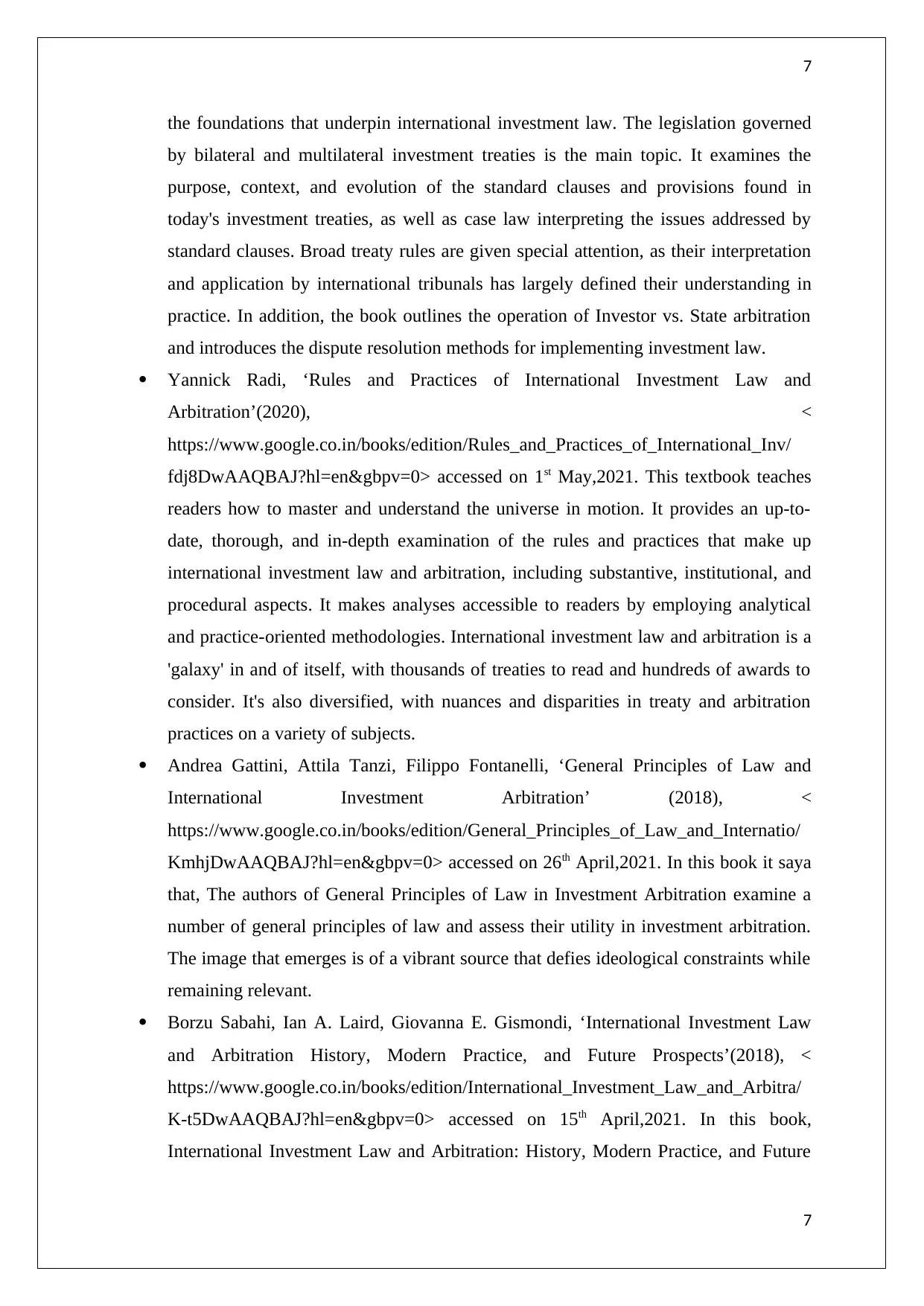
7
the foundations that underpin international investment law. The legislation governed
by bilateral and multilateral investment treaties is the main topic. It examines the
purpose, context, and evolution of the standard clauses and provisions found in
today's investment treaties, as well as case law interpreting the issues addressed by
standard clauses. Broad treaty rules are given special attention, as their interpretation
and application by international tribunals has largely defined their understanding in
practice. In addition, the book outlines the operation of Investor vs. State arbitration
and introduces the dispute resolution methods for implementing investment law.
Yannick Radi, ‘Rules and Practices of International Investment Law and
Arbitration’(2020), <
https://www.google.co.in/books/edition/Rules_and_Practices_of_International_Inv/
fdj8DwAAQBAJ?hl=en&gbpv=0> accessed on 1st May,2021. This textbook teaches
readers how to master and understand the universe in motion. It provides an up-to-
date, thorough, and in-depth examination of the rules and practices that make up
international investment law and arbitration, including substantive, institutional, and
procedural aspects. It makes analyses accessible to readers by employing analytical
and practice-oriented methodologies. International investment law and arbitration is a
'galaxy' in and of itself, with thousands of treaties to read and hundreds of awards to
consider. It's also diversified, with nuances and disparities in treaty and arbitration
practices on a variety of subjects.
Andrea Gattini, Attila Tanzi, Filippo Fontanelli, ‘General Principles of Law and
International Investment Arbitration’ (2018), <
https://www.google.co.in/books/edition/General_Principles_of_Law_and_Internatio/
KmhjDwAAQBAJ?hl=en&gbpv=0> accessed on 26th April,2021. In this book it saya
that, The authors of General Principles of Law in Investment Arbitration examine a
number of general principles of law and assess their utility in investment arbitration.
The image that emerges is of a vibrant source that defies ideological constraints while
remaining relevant.
Borzu Sabahi, Ian A. Laird, Giovanna E. Gismondi, ‘International Investment Law
and Arbitration History, Modern Practice, and Future Prospects’(2018), <
https://www.google.co.in/books/edition/International_Investment_Law_and_Arbitra/
K-t5DwAAQBAJ?hl=en&gbpv=0> accessed on 15th April,2021. In this book,
International Investment Law and Arbitration: History, Modern Practice, and Future
7
the foundations that underpin international investment law. The legislation governed
by bilateral and multilateral investment treaties is the main topic. It examines the
purpose, context, and evolution of the standard clauses and provisions found in
today's investment treaties, as well as case law interpreting the issues addressed by
standard clauses. Broad treaty rules are given special attention, as their interpretation
and application by international tribunals has largely defined their understanding in
practice. In addition, the book outlines the operation of Investor vs. State arbitration
and introduces the dispute resolution methods for implementing investment law.
Yannick Radi, ‘Rules and Practices of International Investment Law and
Arbitration’(2020), <
https://www.google.co.in/books/edition/Rules_and_Practices_of_International_Inv/
fdj8DwAAQBAJ?hl=en&gbpv=0> accessed on 1st May,2021. This textbook teaches
readers how to master and understand the universe in motion. It provides an up-to-
date, thorough, and in-depth examination of the rules and practices that make up
international investment law and arbitration, including substantive, institutional, and
procedural aspects. It makes analyses accessible to readers by employing analytical
and practice-oriented methodologies. International investment law and arbitration is a
'galaxy' in and of itself, with thousands of treaties to read and hundreds of awards to
consider. It's also diversified, with nuances and disparities in treaty and arbitration
practices on a variety of subjects.
Andrea Gattini, Attila Tanzi, Filippo Fontanelli, ‘General Principles of Law and
International Investment Arbitration’ (2018), <
https://www.google.co.in/books/edition/General_Principles_of_Law_and_Internatio/
KmhjDwAAQBAJ?hl=en&gbpv=0> accessed on 26th April,2021. In this book it saya
that, The authors of General Principles of Law in Investment Arbitration examine a
number of general principles of law and assess their utility in investment arbitration.
The image that emerges is of a vibrant source that defies ideological constraints while
remaining relevant.
Borzu Sabahi, Ian A. Laird, Giovanna E. Gismondi, ‘International Investment Law
and Arbitration History, Modern Practice, and Future Prospects’(2018), <
https://www.google.co.in/books/edition/International_Investment_Law_and_Arbitra/
K-t5DwAAQBAJ?hl=en&gbpv=0> accessed on 15th April,2021. In this book,
International Investment Law and Arbitration: History, Modern Practice, and Future
7
Paraphrase This Document
Need a fresh take? Get an instant paraphrase of this document with our AI Paraphraser
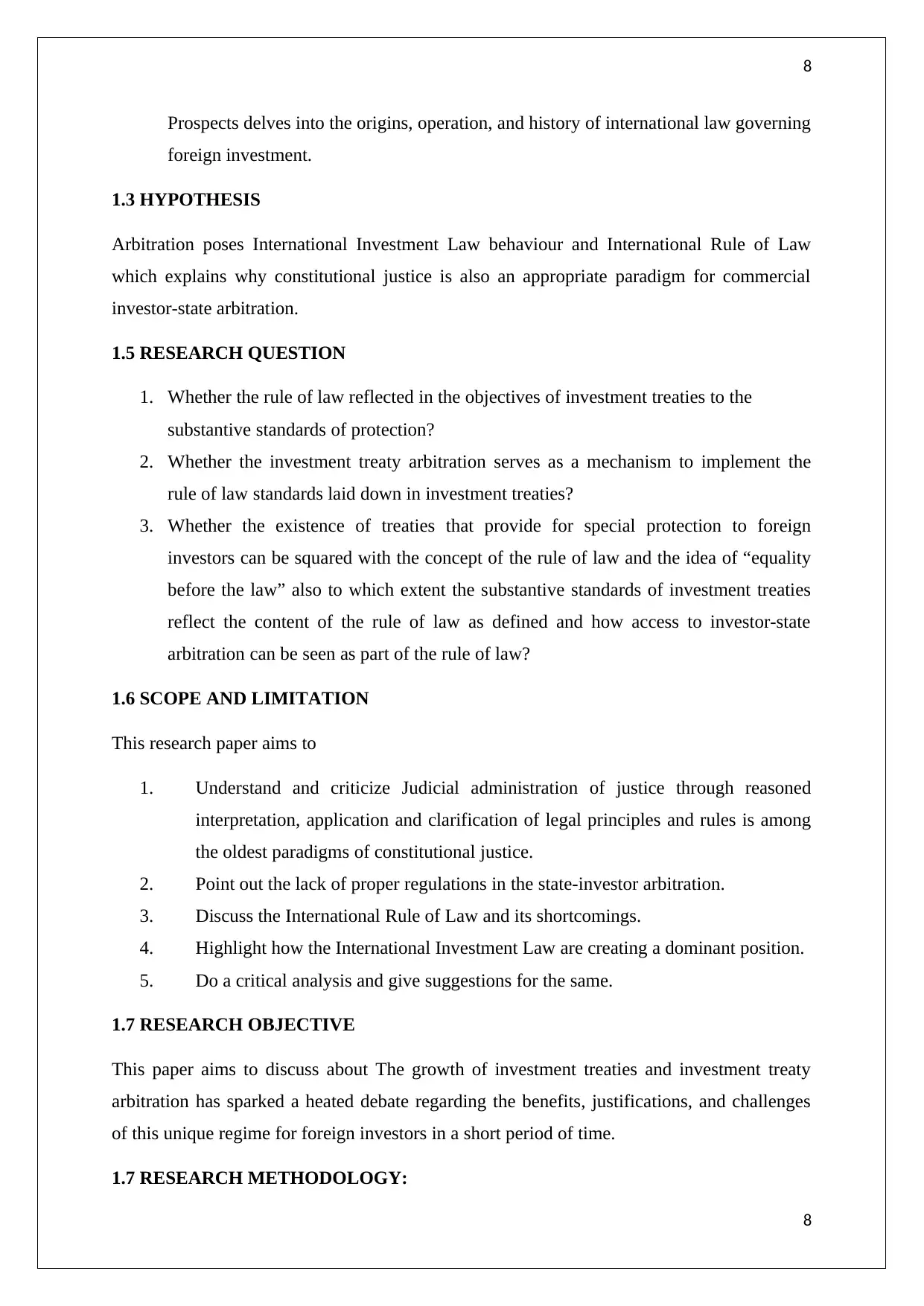
8
Prospects delves into the origins, operation, and history of international law governing
foreign investment.
1.3 HYPOTHESIS
Arbitration poses International Investment Law behaviour and International Rule of Law
which explains why constitutional justice is also an appropriate paradigm for commercial
investor-state arbitration.
1.5 RESEARCH QUESTION
1. Whether the rule of law reflected in the objectives of investment treaties to the
substantive standards of protection?
2. Whether the investment treaty arbitration serves as a mechanism to implement the
rule of law standards laid down in investment treaties?
3. Whether the existence of treaties that provide for special protection to foreign
investors can be squared with the concept of the rule of law and the idea of “equality
before the law” also to which extent the substantive standards of investment treaties
reflect the content of the rule of law as defined and how access to investor-state
arbitration can be seen as part of the rule of law?
1.6 SCOPE AND LIMITATION
This research paper aims to
1. Understand and criticize Judicial administration of justice through reasoned
interpretation, application and clarification of legal principles and rules is among
the oldest paradigms of constitutional justice.
2. Point out the lack of proper regulations in the state-investor arbitration.
3. Discuss the International Rule of Law and its shortcomings.
4. Highlight how the International Investment Law are creating a dominant position.
5. Do a critical analysis and give suggestions for the same.
1.7 RESEARCH OBJECTIVE
This paper aims to discuss about The growth of investment treaties and investment treaty
arbitration has sparked a heated debate regarding the benefits, justifications, and challenges
of this unique regime for foreign investors in a short period of time.
1.7 RESEARCH METHODOLOGY:
8
Prospects delves into the origins, operation, and history of international law governing
foreign investment.
1.3 HYPOTHESIS
Arbitration poses International Investment Law behaviour and International Rule of Law
which explains why constitutional justice is also an appropriate paradigm for commercial
investor-state arbitration.
1.5 RESEARCH QUESTION
1. Whether the rule of law reflected in the objectives of investment treaties to the
substantive standards of protection?
2. Whether the investment treaty arbitration serves as a mechanism to implement the
rule of law standards laid down in investment treaties?
3. Whether the existence of treaties that provide for special protection to foreign
investors can be squared with the concept of the rule of law and the idea of “equality
before the law” also to which extent the substantive standards of investment treaties
reflect the content of the rule of law as defined and how access to investor-state
arbitration can be seen as part of the rule of law?
1.6 SCOPE AND LIMITATION
This research paper aims to
1. Understand and criticize Judicial administration of justice through reasoned
interpretation, application and clarification of legal principles and rules is among
the oldest paradigms of constitutional justice.
2. Point out the lack of proper regulations in the state-investor arbitration.
3. Discuss the International Rule of Law and its shortcomings.
4. Highlight how the International Investment Law are creating a dominant position.
5. Do a critical analysis and give suggestions for the same.
1.7 RESEARCH OBJECTIVE
This paper aims to discuss about The growth of investment treaties and investment treaty
arbitration has sparked a heated debate regarding the benefits, justifications, and challenges
of this unique regime for foreign investors in a short period of time.
1.7 RESEARCH METHODOLOGY:
8
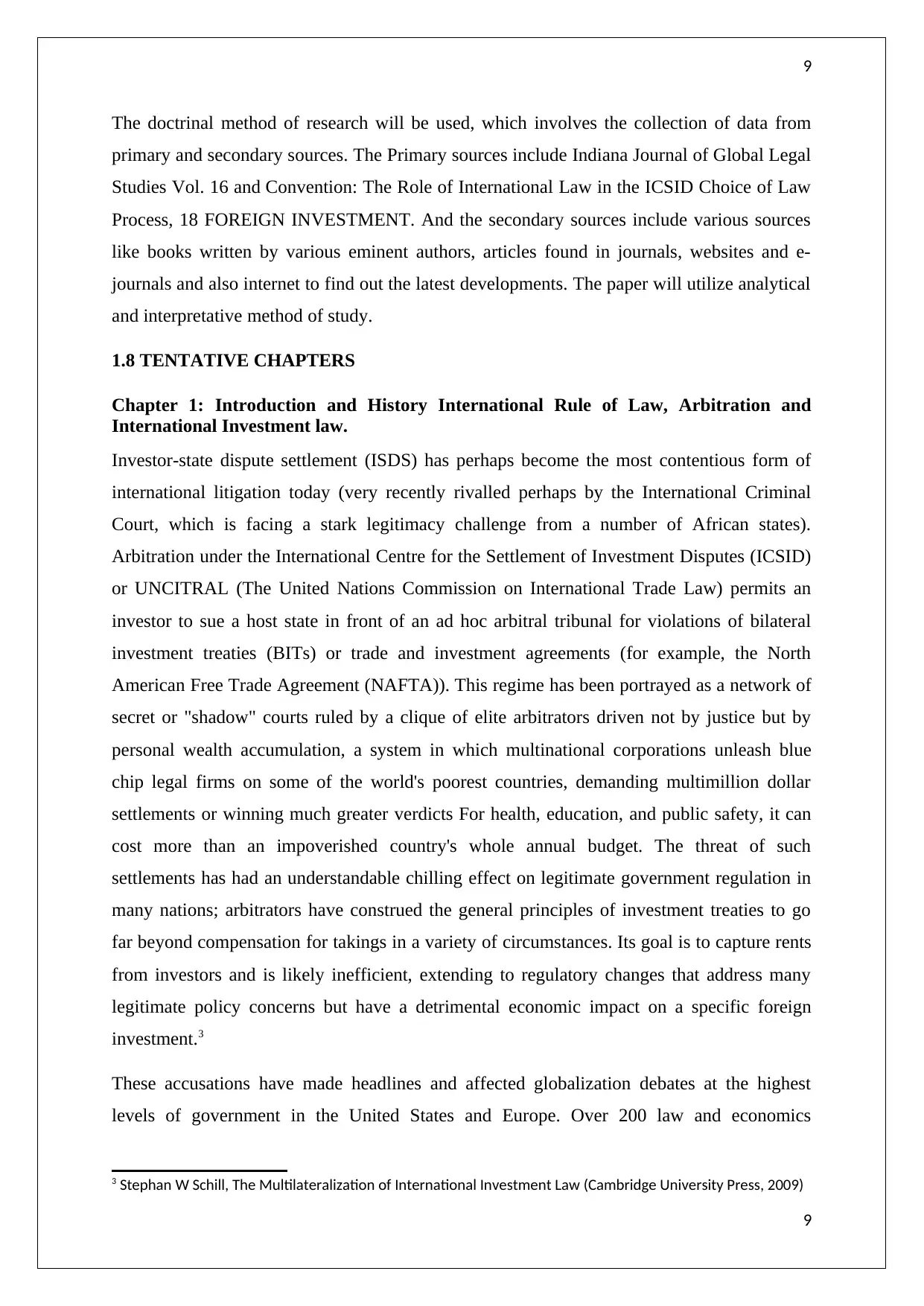
9
The doctrinal method of research will be used, which involves the collection of data from
primary and secondary sources. The Primary sources include Indiana Journal of Global Legal
Studies Vol. 16 and Convention: The Role of International Law in the ICSID Choice of Law
Process, 18 FOREIGN INVESTMENT. And the secondary sources include various sources
like books written by various eminent authors, articles found in journals, websites and e-
journals and also internet to find out the latest developments. The paper will utilize analytical
and interpretative method of study.
1.8 TENTATIVE CHAPTERS
Chapter 1: Introduction and History International Rule of Law, Arbitration and
International Investment law.
Investor-state dispute settlement (ISDS) has perhaps become the most contentious form of
international litigation today (very recently rivalled perhaps by the International Criminal
Court, which is facing a stark legitimacy challenge from a number of African states).
Arbitration under the International Centre for the Settlement of Investment Disputes (ICSID)
or UNCITRAL (The United Nations Commission on International Trade Law) permits an
investor to sue a host state in front of an ad hoc arbitral tribunal for violations of bilateral
investment treaties (BITs) or trade and investment agreements (for example, the North
American Free Trade Agreement (NAFTA)). This regime has been portrayed as a network of
secret or "shadow" courts ruled by a clique of elite arbitrators driven not by justice but by
personal wealth accumulation, a system in which multinational corporations unleash blue
chip legal firms on some of the world's poorest countries, demanding multimillion dollar
settlements or winning much greater verdicts For health, education, and public safety, it can
cost more than an impoverished country's whole annual budget. The threat of such
settlements has had an understandable chilling effect on legitimate government regulation in
many nations; arbitrators have construed the general principles of investment treaties to go
far beyond compensation for takings in a variety of circumstances. Its goal is to capture rents
from investors and is likely inefficient, extending to regulatory changes that address many
legitimate policy concerns but have a detrimental economic impact on a specific foreign
investment.3
These accusations have made headlines and affected globalization debates at the highest
levels of government in the United States and Europe. Over 200 law and economics
3 Stephan W Schill, The Multilateralization of International Investment Law (Cambridge University Press, 2009)
9
The doctrinal method of research will be used, which involves the collection of data from
primary and secondary sources. The Primary sources include Indiana Journal of Global Legal
Studies Vol. 16 and Convention: The Role of International Law in the ICSID Choice of Law
Process, 18 FOREIGN INVESTMENT. And the secondary sources include various sources
like books written by various eminent authors, articles found in journals, websites and e-
journals and also internet to find out the latest developments. The paper will utilize analytical
and interpretative method of study.
1.8 TENTATIVE CHAPTERS
Chapter 1: Introduction and History International Rule of Law, Arbitration and
International Investment law.
Investor-state dispute settlement (ISDS) has perhaps become the most contentious form of
international litigation today (very recently rivalled perhaps by the International Criminal
Court, which is facing a stark legitimacy challenge from a number of African states).
Arbitration under the International Centre for the Settlement of Investment Disputes (ICSID)
or UNCITRAL (The United Nations Commission on International Trade Law) permits an
investor to sue a host state in front of an ad hoc arbitral tribunal for violations of bilateral
investment treaties (BITs) or trade and investment agreements (for example, the North
American Free Trade Agreement (NAFTA)). This regime has been portrayed as a network of
secret or "shadow" courts ruled by a clique of elite arbitrators driven not by justice but by
personal wealth accumulation, a system in which multinational corporations unleash blue
chip legal firms on some of the world's poorest countries, demanding multimillion dollar
settlements or winning much greater verdicts For health, education, and public safety, it can
cost more than an impoverished country's whole annual budget. The threat of such
settlements has had an understandable chilling effect on legitimate government regulation in
many nations; arbitrators have construed the general principles of investment treaties to go
far beyond compensation for takings in a variety of circumstances. Its goal is to capture rents
from investors and is likely inefficient, extending to regulatory changes that address many
legitimate policy concerns but have a detrimental economic impact on a specific foreign
investment.3
These accusations have made headlines and affected globalization debates at the highest
levels of government in the United States and Europe. Over 200 law and economics
3 Stephan W Schill, The Multilateralization of International Investment Law (Cambridge University Press, 2009)
9
⊘ This is a preview!⊘
Do you want full access?
Subscribe today to unlock all pages.

Trusted by 1+ million students worldwide
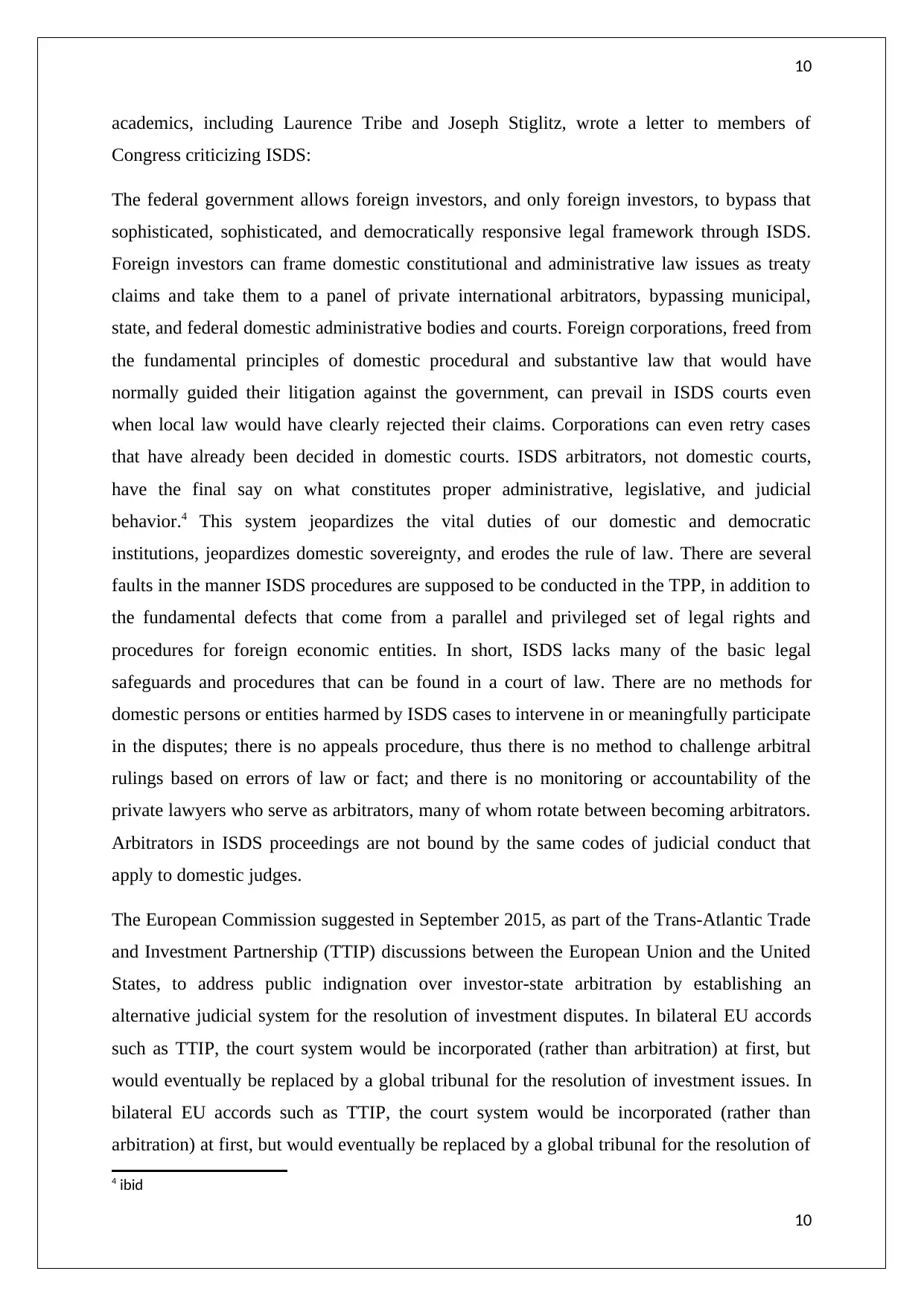
10
academics, including Laurence Tribe and Joseph Stiglitz, wrote a letter to members of
Congress criticizing ISDS:
The federal government allows foreign investors, and only foreign investors, to bypass that
sophisticated, sophisticated, and democratically responsive legal framework through ISDS.
Foreign investors can frame domestic constitutional and administrative law issues as treaty
claims and take them to a panel of private international arbitrators, bypassing municipal,
state, and federal domestic administrative bodies and courts. Foreign corporations, freed from
the fundamental principles of domestic procedural and substantive law that would have
normally guided their litigation against the government, can prevail in ISDS courts even
when local law would have clearly rejected their claims. Corporations can even retry cases
that have already been decided in domestic courts. ISDS arbitrators, not domestic courts,
have the final say on what constitutes proper administrative, legislative, and judicial
behavior.4 This system jeopardizes the vital duties of our domestic and democratic
institutions, jeopardizes domestic sovereignty, and erodes the rule of law. There are several
faults in the manner ISDS procedures are supposed to be conducted in the TPP, in addition to
the fundamental defects that come from a parallel and privileged set of legal rights and
procedures for foreign economic entities. In short, ISDS lacks many of the basic legal
safeguards and procedures that can be found in a court of law. There are no methods for
domestic persons or entities harmed by ISDS cases to intervene in or meaningfully participate
in the disputes; there is no appeals procedure, thus there is no method to challenge arbitral
rulings based on errors of law or fact; and there is no monitoring or accountability of the
private lawyers who serve as arbitrators, many of whom rotate between becoming arbitrators.
Arbitrators in ISDS proceedings are not bound by the same codes of judicial conduct that
apply to domestic judges.
The European Commission suggested in September 2015, as part of the Trans-Atlantic Trade
and Investment Partnership (TTIP) discussions between the European Union and the United
States, to address public indignation over investor-state arbitration by establishing an
alternative judicial system for the resolution of investment disputes. In bilateral EU accords
such as TTIP, the court system would be incorporated (rather than arbitration) at first, but
would eventually be replaced by a global tribunal for the resolution of investment issues. In
bilateral EU accords such as TTIP, the court system would be incorporated (rather than
arbitration) at first, but would eventually be replaced by a global tribunal for the resolution of
4 ibid
10
academics, including Laurence Tribe and Joseph Stiglitz, wrote a letter to members of
Congress criticizing ISDS:
The federal government allows foreign investors, and only foreign investors, to bypass that
sophisticated, sophisticated, and democratically responsive legal framework through ISDS.
Foreign investors can frame domestic constitutional and administrative law issues as treaty
claims and take them to a panel of private international arbitrators, bypassing municipal,
state, and federal domestic administrative bodies and courts. Foreign corporations, freed from
the fundamental principles of domestic procedural and substantive law that would have
normally guided their litigation against the government, can prevail in ISDS courts even
when local law would have clearly rejected their claims. Corporations can even retry cases
that have already been decided in domestic courts. ISDS arbitrators, not domestic courts,
have the final say on what constitutes proper administrative, legislative, and judicial
behavior.4 This system jeopardizes the vital duties of our domestic and democratic
institutions, jeopardizes domestic sovereignty, and erodes the rule of law. There are several
faults in the manner ISDS procedures are supposed to be conducted in the TPP, in addition to
the fundamental defects that come from a parallel and privileged set of legal rights and
procedures for foreign economic entities. In short, ISDS lacks many of the basic legal
safeguards and procedures that can be found in a court of law. There are no methods for
domestic persons or entities harmed by ISDS cases to intervene in or meaningfully participate
in the disputes; there is no appeals procedure, thus there is no method to challenge arbitral
rulings based on errors of law or fact; and there is no monitoring or accountability of the
private lawyers who serve as arbitrators, many of whom rotate between becoming arbitrators.
Arbitrators in ISDS proceedings are not bound by the same codes of judicial conduct that
apply to domestic judges.
The European Commission suggested in September 2015, as part of the Trans-Atlantic Trade
and Investment Partnership (TTIP) discussions between the European Union and the United
States, to address public indignation over investor-state arbitration by establishing an
alternative judicial system for the resolution of investment disputes. In bilateral EU accords
such as TTIP, the court system would be incorporated (rather than arbitration) at first, but
would eventually be replaced by a global tribunal for the resolution of investment issues. In
bilateral EU accords such as TTIP, the court system would be incorporated (rather than
arbitration) at first, but would eventually be replaced by a global tribunal for the resolution of
4 ibid
10
Paraphrase This Document
Need a fresh take? Get an instant paraphrase of this document with our AI Paraphraser
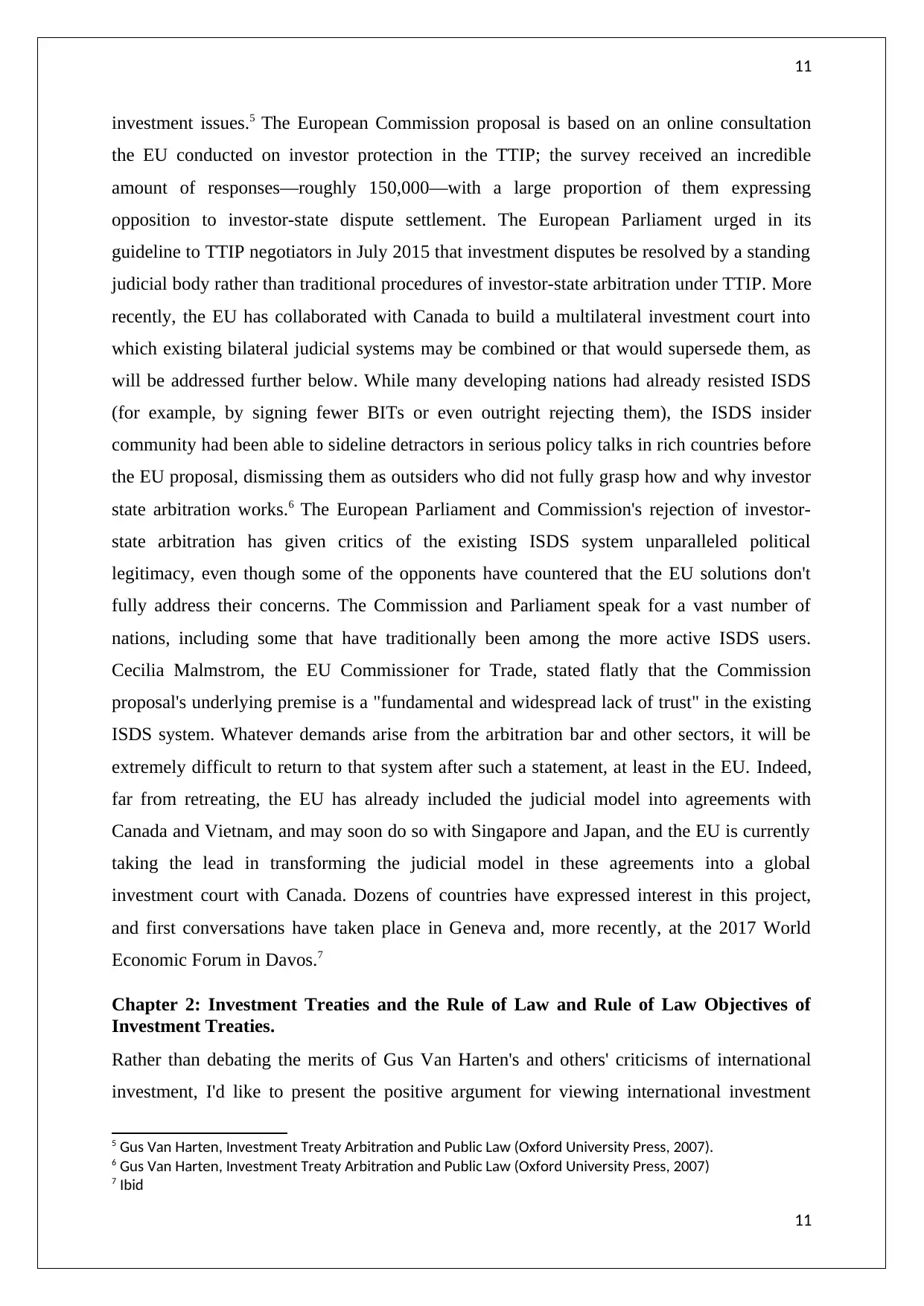
11
investment issues.5 The European Commission proposal is based on an online consultation
the EU conducted on investor protection in the TTIP; the survey received an incredible
amount of responses—roughly 150,000—with a large proportion of them expressing
opposition to investor-state dispute settlement. The European Parliament urged in its
guideline to TTIP negotiators in July 2015 that investment disputes be resolved by a standing
judicial body rather than traditional procedures of investor-state arbitration under TTIP. More
recently, the EU has collaborated with Canada to build a multilateral investment court into
which existing bilateral judicial systems may be combined or that would supersede them, as
will be addressed further below. While many developing nations had already resisted ISDS
(for example, by signing fewer BITs or even outright rejecting them), the ISDS insider
community had been able to sideline detractors in serious policy talks in rich countries before
the EU proposal, dismissing them as outsiders who did not fully grasp how and why investor
state arbitration works.6 The European Parliament and Commission's rejection of investor-
state arbitration has given critics of the existing ISDS system unparalleled political
legitimacy, even though some of the opponents have countered that the EU solutions don't
fully address their concerns. The Commission and Parliament speak for a vast number of
nations, including some that have traditionally been among the more active ISDS users.
Cecilia Malmstrom, the EU Commissioner for Trade, stated flatly that the Commission
proposal's underlying premise is a "fundamental and widespread lack of trust" in the existing
ISDS system. Whatever demands arise from the arbitration bar and other sectors, it will be
extremely difficult to return to that system after such a statement, at least in the EU. Indeed,
far from retreating, the EU has already included the judicial model into agreements with
Canada and Vietnam, and may soon do so with Singapore and Japan, and the EU is currently
taking the lead in transforming the judicial model in these agreements into a global
investment court with Canada. Dozens of countries have expressed interest in this project,
and first conversations have taken place in Geneva and, more recently, at the 2017 World
Economic Forum in Davos.7
Chapter 2: Investment Treaties and the Rule of Law and Rule of Law Objectives of
Investment Treaties.
Rather than debating the merits of Gus Van Harten's and others' criticisms of international
investment, I'd like to present the positive argument for viewing international investment
5 Gus Van Harten, Investment Treaty Arbitration and Public Law (Oxford University Press, 2007).
6 Gus Van Harten, Investment Treaty Arbitration and Public Law (Oxford University Press, 2007)
7 Ibid
11
investment issues.5 The European Commission proposal is based on an online consultation
the EU conducted on investor protection in the TTIP; the survey received an incredible
amount of responses—roughly 150,000—with a large proportion of them expressing
opposition to investor-state dispute settlement. The European Parliament urged in its
guideline to TTIP negotiators in July 2015 that investment disputes be resolved by a standing
judicial body rather than traditional procedures of investor-state arbitration under TTIP. More
recently, the EU has collaborated with Canada to build a multilateral investment court into
which existing bilateral judicial systems may be combined or that would supersede them, as
will be addressed further below. While many developing nations had already resisted ISDS
(for example, by signing fewer BITs or even outright rejecting them), the ISDS insider
community had been able to sideline detractors in serious policy talks in rich countries before
the EU proposal, dismissing them as outsiders who did not fully grasp how and why investor
state arbitration works.6 The European Parliament and Commission's rejection of investor-
state arbitration has given critics of the existing ISDS system unparalleled political
legitimacy, even though some of the opponents have countered that the EU solutions don't
fully address their concerns. The Commission and Parliament speak for a vast number of
nations, including some that have traditionally been among the more active ISDS users.
Cecilia Malmstrom, the EU Commissioner for Trade, stated flatly that the Commission
proposal's underlying premise is a "fundamental and widespread lack of trust" in the existing
ISDS system. Whatever demands arise from the arbitration bar and other sectors, it will be
extremely difficult to return to that system after such a statement, at least in the EU. Indeed,
far from retreating, the EU has already included the judicial model into agreements with
Canada and Vietnam, and may soon do so with Singapore and Japan, and the EU is currently
taking the lead in transforming the judicial model in these agreements into a global
investment court with Canada. Dozens of countries have expressed interest in this project,
and first conversations have taken place in Geneva and, more recently, at the 2017 World
Economic Forum in Davos.7
Chapter 2: Investment Treaties and the Rule of Law and Rule of Law Objectives of
Investment Treaties.
Rather than debating the merits of Gus Van Harten's and others' criticisms of international
investment, I'd like to present the positive argument for viewing international investment
5 Gus Van Harten, Investment Treaty Arbitration and Public Law (Oxford University Press, 2007).
6 Gus Van Harten, Investment Treaty Arbitration and Public Law (Oxford University Press, 2007)
7 Ibid
11
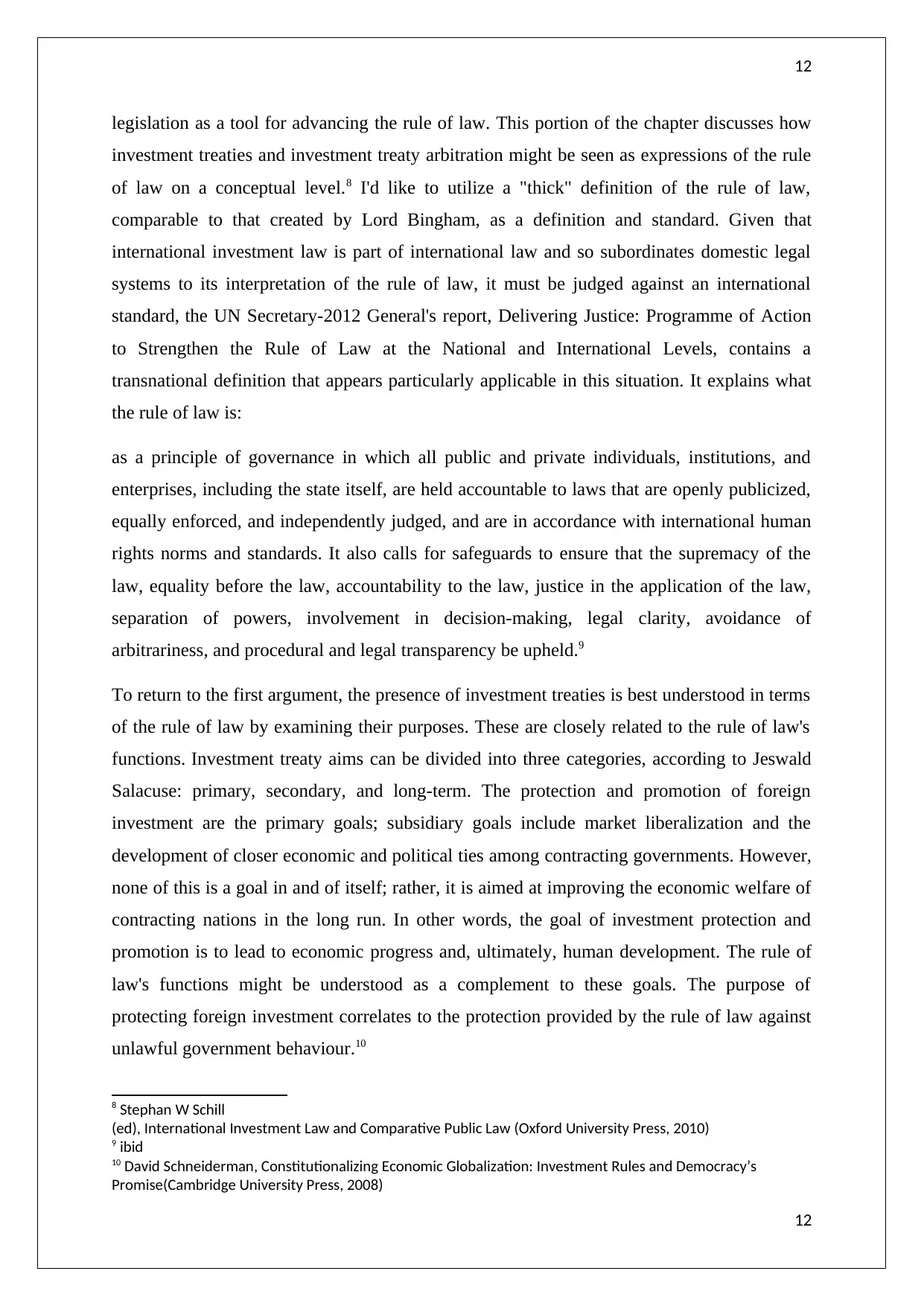
12
legislation as a tool for advancing the rule of law. This portion of the chapter discusses how
investment treaties and investment treaty arbitration might be seen as expressions of the rule
of law on a conceptual level.8 I'd like to utilize a "thick" definition of the rule of law,
comparable to that created by Lord Bingham, as a definition and standard. Given that
international investment law is part of international law and so subordinates domestic legal
systems to its interpretation of the rule of law, it must be judged against an international
standard, the UN Secretary-2012 General's report, Delivering Justice: Programme of Action
to Strengthen the Rule of Law at the National and International Levels, contains a
transnational definition that appears particularly applicable in this situation. It explains what
the rule of law is:
as a principle of governance in which all public and private individuals, institutions, and
enterprises, including the state itself, are held accountable to laws that are openly publicized,
equally enforced, and independently judged, and are in accordance with international human
rights norms and standards. It also calls for safeguards to ensure that the supremacy of the
law, equality before the law, accountability to the law, justice in the application of the law,
separation of powers, involvement in decision-making, legal clarity, avoidance of
arbitrariness, and procedural and legal transparency be upheld.9
To return to the first argument, the presence of investment treaties is best understood in terms
of the rule of law by examining their purposes. These are closely related to the rule of law's
functions. Investment treaty aims can be divided into three categories, according to Jeswald
Salacuse: primary, secondary, and long-term. The protection and promotion of foreign
investment are the primary goals; subsidiary goals include market liberalization and the
development of closer economic and political ties among contracting governments. However,
none of this is a goal in and of itself; rather, it is aimed at improving the economic welfare of
contracting nations in the long run. In other words, the goal of investment protection and
promotion is to lead to economic progress and, ultimately, human development. The rule of
law's functions might be understood as a complement to these goals. The purpose of
protecting foreign investment correlates to the protection provided by the rule of law against
unlawful government behaviour.10
8 Stephan W Schill
(ed), International Investment Law and Comparative Public Law (Oxford University Press, 2010)
9 ibid
10 David Schneiderman, Constitutionalizing Economic Globalization: Investment Rules and Democracy’s
Promise(Cambridge University Press, 2008)
12
legislation as a tool for advancing the rule of law. This portion of the chapter discusses how
investment treaties and investment treaty arbitration might be seen as expressions of the rule
of law on a conceptual level.8 I'd like to utilize a "thick" definition of the rule of law,
comparable to that created by Lord Bingham, as a definition and standard. Given that
international investment law is part of international law and so subordinates domestic legal
systems to its interpretation of the rule of law, it must be judged against an international
standard, the UN Secretary-2012 General's report, Delivering Justice: Programme of Action
to Strengthen the Rule of Law at the National and International Levels, contains a
transnational definition that appears particularly applicable in this situation. It explains what
the rule of law is:
as a principle of governance in which all public and private individuals, institutions, and
enterprises, including the state itself, are held accountable to laws that are openly publicized,
equally enforced, and independently judged, and are in accordance with international human
rights norms and standards. It also calls for safeguards to ensure that the supremacy of the
law, equality before the law, accountability to the law, justice in the application of the law,
separation of powers, involvement in decision-making, legal clarity, avoidance of
arbitrariness, and procedural and legal transparency be upheld.9
To return to the first argument, the presence of investment treaties is best understood in terms
of the rule of law by examining their purposes. These are closely related to the rule of law's
functions. Investment treaty aims can be divided into three categories, according to Jeswald
Salacuse: primary, secondary, and long-term. The protection and promotion of foreign
investment are the primary goals; subsidiary goals include market liberalization and the
development of closer economic and political ties among contracting governments. However,
none of this is a goal in and of itself; rather, it is aimed at improving the economic welfare of
contracting nations in the long run. In other words, the goal of investment protection and
promotion is to lead to economic progress and, ultimately, human development. The rule of
law's functions might be understood as a complement to these goals. The purpose of
protecting foreign investment correlates to the protection provided by the rule of law against
unlawful government behaviour.10
8 Stephan W Schill
(ed), International Investment Law and Comparative Public Law (Oxford University Press, 2010)
9 ibid
10 David Schneiderman, Constitutionalizing Economic Globalization: Investment Rules and Democracy’s
Promise(Cambridge University Press, 2008)
12
⊘ This is a preview!⊘
Do you want full access?
Subscribe today to unlock all pages.

Trusted by 1+ million students worldwide
1 out of 24
Related Documents
Your All-in-One AI-Powered Toolkit for Academic Success.
+13062052269
info@desklib.com
Available 24*7 on WhatsApp / Email
![[object Object]](/_next/static/media/star-bottom.7253800d.svg)
Unlock your academic potential
Copyright © 2020–2026 A2Z Services. All Rights Reserved. Developed and managed by ZUCOL.



